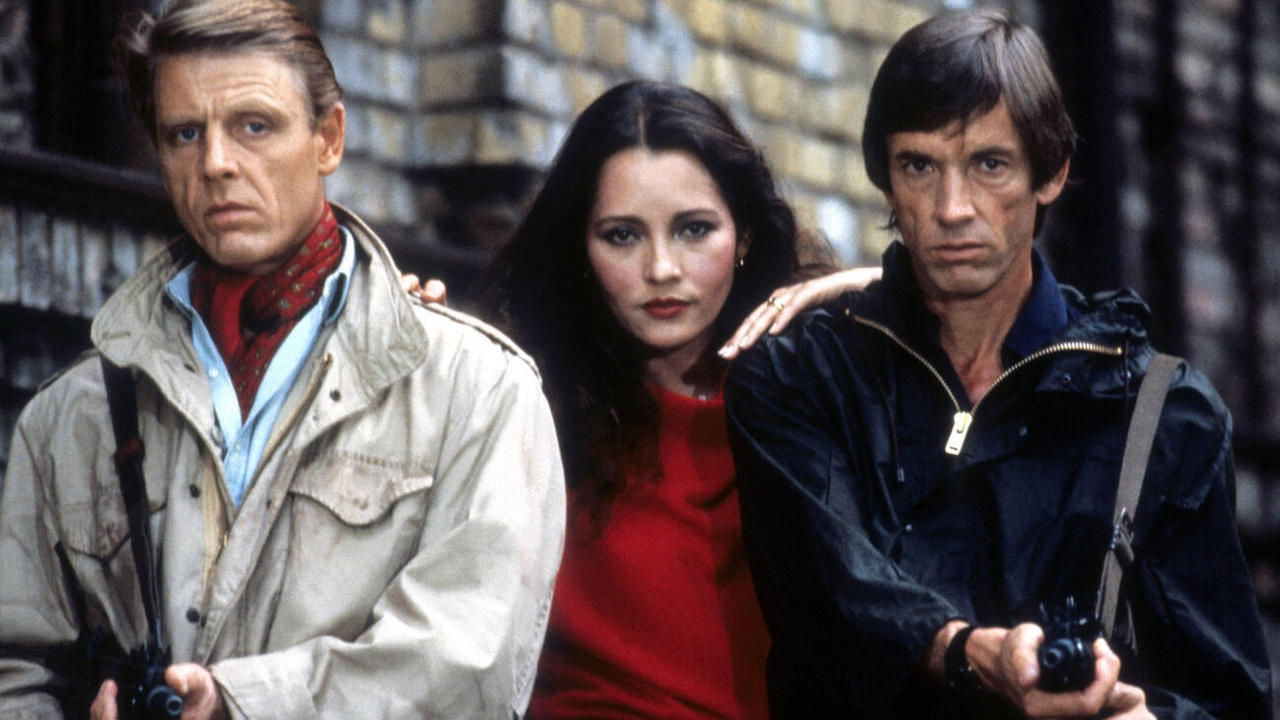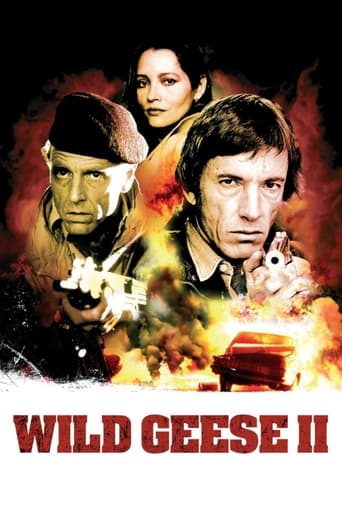

WILD GEESE II is a stand-alone sequel to the Richard Burton film; none of the cast return and the story is quite different here with different characters in a different situation. This is a men-on-a-mission film in which some mercenaries are tasked with springing notorious Nazi Rudolph Hess from a Russian-run prison in West Berlin, a task which is every bit as tense and difficult as it sounds.This is a largely criticised movie that suffers from having an overlong running time; around the middle part of the production the pacing really flags and half an hour could easily have been cut out to give it more pace and momentum. Saying that, the pacing problems are really the only problem the film has, as otherwise it's a solid thriller with interesting cast members and well-directed action from old-timer Peter Hunt.The story and execution reminded me of RONIN a little, although the Frankenheimer film is by far the better of the two. Scott Glenn makes for a taciturn hero although Barbara Carrera is a weak spot as the female of the piece, reduced to a screaming damsel-in-distress by the end. The best role goes to Edward Fox, riffing on his old DAY OF THE JACKAL character. Laurence Olivier's cameo as Rudolph Hess is a memorable one even if he gets little screen time, while Derek Thompson is also fine as a slimy IRA man. The supporting actors are all effective too. Once the pacing picks up, WILD GEESE II remains entertaining through to the end, and the action is stark and realistic; I liked it.
... View MoreThis movie is the saddest failure in film history. You have to know that legendary film producer Euan Lloyd accepted to make the film in despite of the fact that insurances refused to cover Richard Burton. It was an ultimate proof of courage and loyalty to a friend, sadly rewarded by a tragedy : Richard Burton died one day before shooting. Burton, before dying, was very enthusiastic about the filming of "Wild Geese II. Something he would have never been if it was to act in an illogical story where he's not the leader anymore (the final movie). Actress Ingrid Pitt is also very clear : it was supposed to be the new big production starring Richard Burton. So it's ridiculous to imagine that Burton would have played the role played by his substitute Edward Fox (who plays his brother in the film) : it's true in only a few scenes. Most of Richard Burton's dialogs are in fact delivered by Scott Glenn, who plays the leading mercenary in the final version. The sniper is definitively NOT a role invented for Burton to take in account the fact that he had difficulties to walk (he had a surgery on his spine at the beginning of 1984) : it was in the book ! But reliable sources effectively claim that Burton would have been the sniper. But if Burton plays the role of Edward Fox, he's not the leader anymore and the story is ridiculous (like in the shot movie). So : where is the truth ? In fact Burton would have been the sniper in the first part of the movie. If you re-watch the film, you can see Edward Fox limping like Burton would have done it because of his surgery : Faulkner meets the Lukas' at EBC in London, the second interview between Glenn and the Lukas was in fact the continuation of Faulkner's: Burton's Faulkner would have accepted the mission of course and then hired immediately Haddad in London to help him. They exchange in London the funny dialogs about Faulkner's leg that you hear in the final movie when they come back to Berlin, after that they fly together to Berlin. All this is not in the book and was found out to let Glenn handle the action scenes (with still Burton as the logical leader of the mission). So in the script, in Berlin, Glenn jogs around the Spandau Prison under Faulkner's protection (hidden as a sniper somewhere in a building). Faulkner reports to Kathy at the stadium, then again Scott Glenn-Haddad visits the barracks for a closer observation of Spandau. When he leaves, some people try to kidnap him. In the final film he's kidnapped, but here Faulkner (still the sniper) shoots to save him, Haddad manages to escape but Faulkner not (because of his leg) and is quickly found, taken, violently interrogated and left for dead on the highway. You understand also that if Faulkner doesn't meet Reed-Henry at the hospital, it complicates unnecessarily the story. Unnecessarily because Burton could have played these scenes without a problem (except his limping, he was at his peak) and it's the leader of the mission who has to talk to the key characters who could help to organize the escape. Faulkner would have then re-met Kathy and explained to her that he has to be forgotten a little after these assassination attempt that he survived and goes to Bavaria before he meets again with Haddad in Munich. From there, the 3 of them (Faulkner, Kathy, Haddad) go back to Berlin. Faulkner is for one last time the sniper in the Turkish alley : he asks Haddad to lead Stroebling's men to that place and the final shooting is in the movie. From that very moment : if you let Faulkner keeping on being the sniper, the colonel Faulkner isn't the leader anymore and lets Glenn handling the dialog scenes. A nonsense that you can experience in the final version : Glenn delivers very poorly his dialogs and makes the movie look like a slow TV-movie, Burton would have set all these scenes under high tension. Again : re-watch those scenes, all of them are decisive and superbly written for an actor like Burton. On the contrary, Glenn would have attacked alone the warehouse towards the end, while Burton would have taken the lead on the accident's site. In fact, from the moment they return to Berlin, Glenn would have played almost exactly (except in the Turkish alley and in Austria at the end)the role of Edward Fox (who just took Burton's clothes and nothing else). That second part of the movie would have been very close to the novel. Of course : many scenes would have been far more spectacular. The helicopters that you see on the poster drawn for the movie starring Burton are absent from the final film but would have appeared towards the end : before the attempt to free Hess, there was supposed to be a massive operation of the British army (a simulated reaction to a Russian invasion, a training, but at a large scale in the conditions of reality, where the army has to evacuate British families from Berlin and so on...). It was Reed-Henry's idea to help the mercenaries to take advantage of that confusion during their own rescue operation. All this disappeared. But you could find many other examples like that by reading the book. Carney's novel is a masterpiece wonderfully respected by Reginald Rose. I really hope that this review helped you to imagine the pure masterpiece Euan Lloyd was about to deliver along with Richard Burton, Reginald Rose and Roy Budd (his music for that film is one of the most powerful themes ever composed in cinema history).
... View MoreGreat film. This film is very different to the first oneand is also very enjoyable. It has a lot of very good action and an interesting story as well as being shot on location in pre 1989 Berlin. I like the music too. There are some clichés but it has lots of thrills and will teach you something about German history.I live In Berlin myself but moved here after the wall came down so this film gives you some idea what it was like to live here when the city was divided. Berlin is a fascinating city and has a lot to offer. This film does more than just tell a story- it gives you some insight into the 80s in Berlin.
... View MoreUnlike 1978's The Wild Geese which was chock full of story, action and even some moral values this apparent sequel comes up short on all accounts. A plan to spring Nazi War criminal Rudolf Hess from his cell in Spandau prison by a team of Mercenaries is the basis of the movie. The story is slow and fails to establish any likeable characters as the original did. Sadly Richard Burton who was to recreate the Colonel Faulkner role died before filming began and was replaced by Edward Fox who seems shallow in his performance. As the film progresses the viewer keeps waiting for something to get going but it never seems to. In all a sad disappointment.
... View More